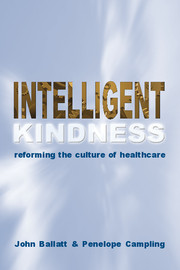Book contents
6 - Cooperation and fragmentation
from Part II - The struggle with kindness
Published online by Cambridge University Press: 01 January 2018
Summary
The only thing that will redeem mankind is cooperation.
(Bertrand Russell)Fragmented systems
The team is a vital medium in which to nourish attentive and compassionate work with patients. The way a team manages anxiety, work pressures, interpersonal relationships and its tasks can bring the best out in its members and create a buffer against organisational processes that might otherwise tend to undermine patient-centred care. But teams are not ‘islands’, and this chapter shifts to focus on the wider system. The increasingly sophisticated specialist expertise and technologies that have developed, and the complexity of organisational and management systems typically involved in a patient's journey, mean that the relationships between teams are as important as the relationships within the team. For example, a cancer patient may need a combination of primary care, general medicine, surgery, radiotherapy, radiology, pathology and hospice care. The overall quality of cancer care this patient receives will depend not on the presence of a brilliant single health professional or team but on each professional interacting well with all the other involved elements of the system.
It is not uncommon to hear of patients being sent from one end of the hospital to the other, turning up for investigations at departments that have never heard of them, waiting for hours while their notes are tracked down, having to recount their story over and over again. Experiences like this are not just inconvenient: they break down patients’ trust and the capacity of the system to attend to their needs. Patients will not feel kindly treated if their experience is fragmented and if there is no continuity of relationship. If communication between teams is inadequate, staff will not have the personal and detailed information about the patient that makes kindness so much easier. Poor communication can underpin poor care, neglect and error. Many reports into tragedies involving people with a mental illness or in child protection have highlighted discontinuity and breakdowns in communication, with a consequent loss of a whole view of patients and of a real personal connection with them (Ritchie, 1994; Laming, 2003).
- Type
- Chapter
- Information
- Intelligent KindnessReforming the Culture of Healthcare, pp. 84 - 99Publisher: Royal College of PsychiatristsPrint publication year: 2011



